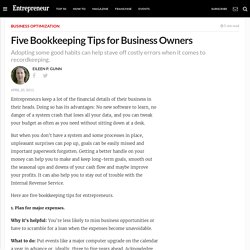

Five Bookkeeping Tips for Business Owners. Entrepreneurs keep a lot of the financial details of their business in their heads.

Doing so has its advantages: No new software to learn, no danger of a system crash that loses all your data, and you can tweak your budget as often as you need without sitting down at a desk. But when you don't have a system and some processes in place, unpleasant surprises can pop up, goals can be easily missed and important paperwork forgotten. Getting a better handle on your money can help you to make and keep long-term goals, smooth out the seasonal ups and downs of your cash flow and maybe improve your profits. It can also help you to stay out of trouble with the Internal Revenue Service. Here are five bookkeeping tips for entrepreneurs. 1. Why it's helpful: You're less likely to miss business opportunities or have to scramble for a loan when the expenses become unavoidable. What to do: Put events like a major computer upgrade on the calendar a year in advance or, ideally, three to five years ahead. Finance & Capital Markets.
Stanford Social Innovation Review. Money is a constant topic of conversation among nonprofit leaders: How much do we need?

Where can we find it? Why isn’t there more of it? In tough economic times, these types of questions become more frequent and pressing. Unfortunately, the answers are not readily available. That’s because nonprofit leaders are much more sophisticated about creating programs than they are about funding their organizations, and philanthropists often struggle to understand the impact (and limitations) of their donations. There are consequences to this financial fuzziness.
In the for-profit world, by contrast, there is a much higher degree of clarity on financial issues. The value of such shorthand is that it allows business leaders to articulate quickly and clearly how they will succeed in the marketplace, and it allows investors to quiz executives more easily about how they intend to make money.
Beneficiaries Are Not Customers Duke University business professor J. Ten Funding Models. Scotiabank - Get Growing for Business - How to monitor the financial performance of your business. You don’t need to be a math wizard to understand which numbers can tell you how well or how poorly your business is doing.

But you do need regular financial updates and the discipline to sit down and check the key performance indicators (KPIs) that matter most: sales, profit margins and cash flow. It’s important to check your finances every month, because it will give you the chance to course-correct any strategies throughout the year. Waiting to review year-end figures may be too late because there’s little you can do to change historic numbers. Get to know your financial statements Fortunately, modern accounting software makes it easy to generate financial statements so you can perform some quick calculations to check the financial health of your business.
You will find the information you need within the Income Statement, Cash Flow Forecast and Balance Sheet. Watch these key figures: Stock turnover Debt turnover A low debt turnover ratio means accounts are being paid reasonably fast. The Startup Guide - Creating a Better World Through Entrepreneurship. The iContact Team in October 2011 By Ryan Allis Being the CEO of a startup is one of the most challenging roles out there.
Your job is to build a product customers love; recruit a team; find funding from customers, partners, or investors; and guide the overall prioritization of work. In my experience the three most important components of the Start-up CEO’s role are: Creating a product that solves a real customer need (and convincing customers to pay for it).Making sure your users and customers have an extremely positive emotional experience with your product.Recruiting a great team to build your product. Yes, you’re also in charge of incorporating, finding a place to work, creating the foundations of your culture, hiring your first employees, setting up a bank account, creating a web site, finding early stage funding, and taking out the trash.
Here’s what I learned at iContact about being a startup CEO. Before You Have Employees Determining the Initial Equity Split Incorporating Cash is King.